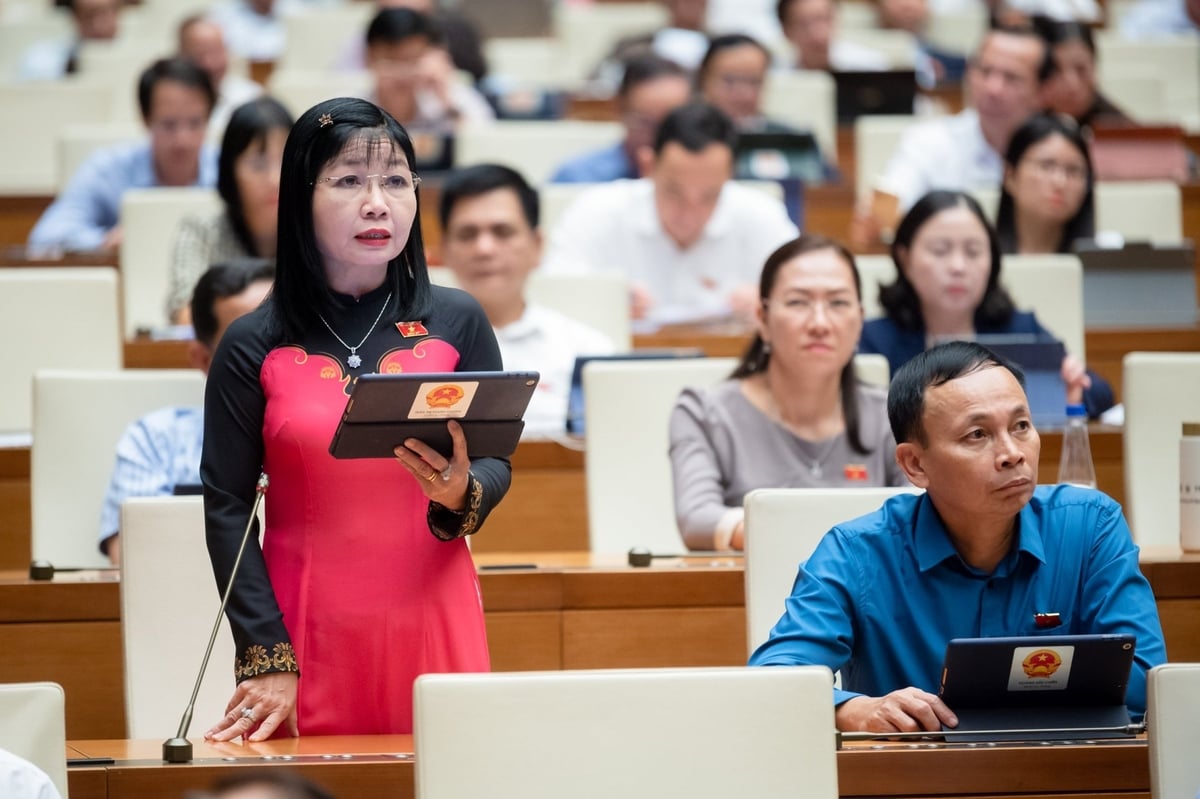December 17, 2025 | 00:44 GMT +7
December 17, 2025 | 00:44 GMT +7
Hotline: 0913.378.918
December 17, 2025 | 00:44 GMT +7
Hotline: 0913.378.918
Ms. Tran Thi Thanh Huong, the Head of the An Giang delegation of National Assembly deputies, expressed the concerns and expectations of local farmers in relation to two critical issues: the rampant use of counterfeit, low-quality agricultural inputs and the severe waste of agricultural by-products as untapped resources, during the ongoing National Assembly session.

Head of the National Assembly delegation of An Giang province, Ms. Tran Thi Thanh Huong. Photo: Pham Thang.
"Substandard pesticides and counterfeit fertilizers not only diminish yields and cause economic harm, but they also subtly undermine consumer confidence and damage the reputation of Vietnamese agricultural products", stated Ms. Huong.
She cited data indicating that Vietnam currently has approximately 700 fertilizer manufacturers who produce tens of thousands of different products. Over 4,300 branded pesticides are available.
The utilization of fertilizers by Vietnamese farmers is approximately 11 to 12 million tons per year. Nevertheless, the agricultural sector experiences an estimated annual loss of 2.5 billion USD as a result of the use of substandard or counterfeit goods.
In Ms. Huong's opinion, the consequences extend beyond soil depletion and lower yields. This undermines the credibility of Vietnamese products in both domestic and international markets, as they have a ripple effect throughout the entire agricultural value chain.
She encouraged the authorities to implement more robust technical barriers to effectively regulate the quality of pesticides and fertilizers. Simultaneously, she emphasized the need to clarify the roles of licensing, inspection, and market control agencies in order to prevent the current state of affairs, in which "everyone is in charge, but no one is accountable."

Discarded durian husks in open areas without a clear plan for reuse. Photo: Nhat Truong/VOV.
She also advocated for severe penalties against not only manufacturers and traders of counterfeit products, but also individuals and organizations that facilitate such violations.
The second issue the An Giang representative raised was the underutilization of agricultural by-products, which is a missing link in Vietnam's circular economy.
Vietnam produces more than 156 million tons of agricultural by-products annually, as per Ms. Huong. Experts regard these as a "gold mine," a potential source of organic fertilizer, livestock feed, and bio-based materials, despite the fact that they may appear to many as "waste".
"If processed and utilized effectively, these resources have the potential to double the economic value of agricultural production and alleviate the need to sell primary products during peak harvests", she observed.
However, the current situation is that the majority of this biomass is either burned, buried, or discharged into the environment, resulting in increased greenhouse gas emissions and pollution. Meanwhile, she emphasized that Vietnam continues to import substantial quantities of fertilizers from abroad, a paradox that results in annual losses of hundreds of billions of dong.
Ms. Huong is of the opinion that National Assembly Resolution No. 57, which encourages the incorporation of science, technology, and digital transformation into agriculture, offers a substantial opportunity to address this obstacle. However, for policies to be effectively implemented, by-product processing technologies must be tailored to the specific needs of the real world, including the scale of local enterprises and cooperatives across regions and types of products, as well as smallholder production.
These two concerns, which include maximizing the effectiveness of by-product use and preventing counterfeiting, are not new. However, they continue to pose significant obstacles to Vietnam's efforts to establish a sustainable, circular, and environmentally friendly agricultural sector.
Vietnam's agricultural economy will only reach its full potential when farmers can depend on high-quality agricultural inputs and observe their produce and by-products functioning optimally.
Each year, Vietnam generates over 156 million tons of agricultural by-products, from rice straw and sugarcane bagasse to durian husks and shrimp shells. But instead of being reused, most of it is burned, buried, or dumped, polluting the environment and wasting resources. Meanwhile, Vietnam spends heavily to import chemical fertilizers and animal feed, resources that could, in fact, be produced from these very by-products. Experts call this a “gold mine left untouched.
Turning this waste into value isn’t just about green growth, it’s about boosting farmers’ incomes, reducing trade deficits, and building a more resilient agricultural economy. To get there, Vietnam must invest in practical, localized technologies and remove barriers that keep by-product processing from scaling up. The choice is clear: treat waste as a burden, or transform it into a pillar of sustainable agriculture.
Translated by Linh Linh

(VAN) Trading forest carbon credits is to reduce greenhouse gas emissions while creating sustainable livelihoods for local communities.

(VAN) Expanding the area of forests with FSC certification creates a foundation for elevating the economic value of forests, promoting sustainable management, and offering opportunities to participate in the carbon credit market.

(VAN) MAE and GIZ organized the conference to strengthening capacity and readiness for EUDR implementation in Vietnam.

(VAN) When women, men, children, and people with disabilities all have the opportunity to maximize their potential, the economy will grow, and the country will prosper.

(VAN) Effective disaster prevention and the creation of sustainable livelihoods through practical forestry policies are the distinct and crucial values of special-use and protection forests.

(VAN) The policy movement regarding carbon emission reduction is opening up a new approach, linking national goals with practical agricultural production.

(VAN) Deputy Prime Minister Tran Hong Ha made this request at the 24th meeting of the National Steering Committee for Combating IUU Fishing with 21 coastal provinces and cities joining virtually.